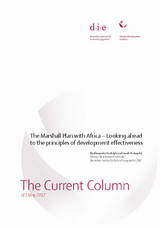The Current Column
The Marshall Plan with Africa – Looking ahead to the principles of development effectiveness
Rudolph, Alexandra / Sarah HolzapfelThe Current Column (2017)
Bonn: German Development Institute / Deutsches Institut für Entwicklungspolitik (DIE) (The Current Column of 02.05.2017)
Development Minister Müller’s Marshall Plan with Africa includes key points for a new German development strategy with Africa. The suggestions link public and private development cooperation with African approaches, such as the Agenda 2063 of the African Union and, in addition, include peacebuilding and the promotion of governance as key aspects. The goal is sustainable development on the African continent within the scope of the Sustainable Development Goals (SDGs). To reach this goal, development cooperation should be efficient and effective in line with the 2030 Agenda, and private investments in Africa should pursue long-term development. Therefore, the Marshall Plan should include development effectiveness criteria for public and private players from the beginning, and thereby take the development effectiveness agenda further. Development effectiveness and the Marshall Plan The outline of the Africa strategy already includes critical requirements of the development effectiveness agenda adopted at international conferences in Paris, Accra and Busan. These are, for example, policy coherence, a focus of development cooperation on strategies of partners and multi-stakeholder partnerships between central and local governments, parliaments, civil society and the private sector. However, the outline does not yet sufficiently take into account equally important principles, such as using country systems to plan, implement and evaluate development cooperation initiatives, and greater transparency and results orientation. In order to create an effective Africa strategy, players such as the Global Partnership for Effective Development Cooperation (GPEDC) and the United Nations’ Global Partnerships for sustainable development (SDG 17) should be included in the planning and implementation of the Marshall Plan. Ensuring lasting impact from private investments When promoting private investments, is should be ensured that they will have a lasting developmental impact. It is important to mobilise and promote investments that have sustainable, cross-sectoral and environmental objectives, as well as widespread potential to create jobs and opportunities for professional development. Sustainable development through private investments thus requires persistence and transparent decision-making, as well as a systematic evaluation of positive as well as negative, unintentional outcomes. This should also be considered with regard to the promotion of private investments within the framework of the G20’s Compact with Africa. Experience and examples of cooperation are provided by the New Alliance for Food and Nutrition Security, which uses aid to promote private investments through reforms. As well as this, we can also make use of the experience of organisations such as the World Bank’s International Finance Corporation (IFC), which support private institutions in the area of sustainable development in developing countries. Based on this, governments should work together with businesses in order to establish effectiveness criteria as an indication for sustainable support measures when cooperating with the private sector. These criteria should be reviewed and critically evaluated by the multi-stakeholder platform GPEDC with the goal to further reforms that are directed at the needs of the population whilst also improving the predictability of business prospects and investment opportunities for companies. Effective Africa policy On the one hand, it will be a deciding factor for the success and effectiveness of an Africa strategy whether the promise to use and promote African concepts and structures is kept. In practice, this means that development cooperation must be aligned with the national sustainability strategies of its African partners and use its institutions to plan, implement and evaluate the results of development cooperation in order to strengthen them. On the other hand, the goal of a new Africa strategy cannot be to simply promote reform-oriented states that demonstrate legal security and political participation. The continent is home to a relatively large number of fragile and very poor African states with weak governance structures, whose institutions barely have the capacity for aid programmes. More flexible tools with regards to development cooperation are needed, as well as a clever combination of strategic partnerships with “reform champions” and stabilising efforts in fragile states. Short-term reforms and quick economic gains can jeopardise sustainable development and can contribute towards spreading conflict. Within the framework of the 2030 Agenda, donors committed to giving 15 to 20 percent of official development assistance to fragile states and poorly developed countries in order to specifically support their development. German development cooperation should not back away from this commitment, but rather should find smart cooperation patterns to combine the efforts of public and private development cooperation actors. To this end, the Marshall Plan should clearly specify development effectiveness criteria, and, in addition, should make these mandatory for the promotion of private investments.


